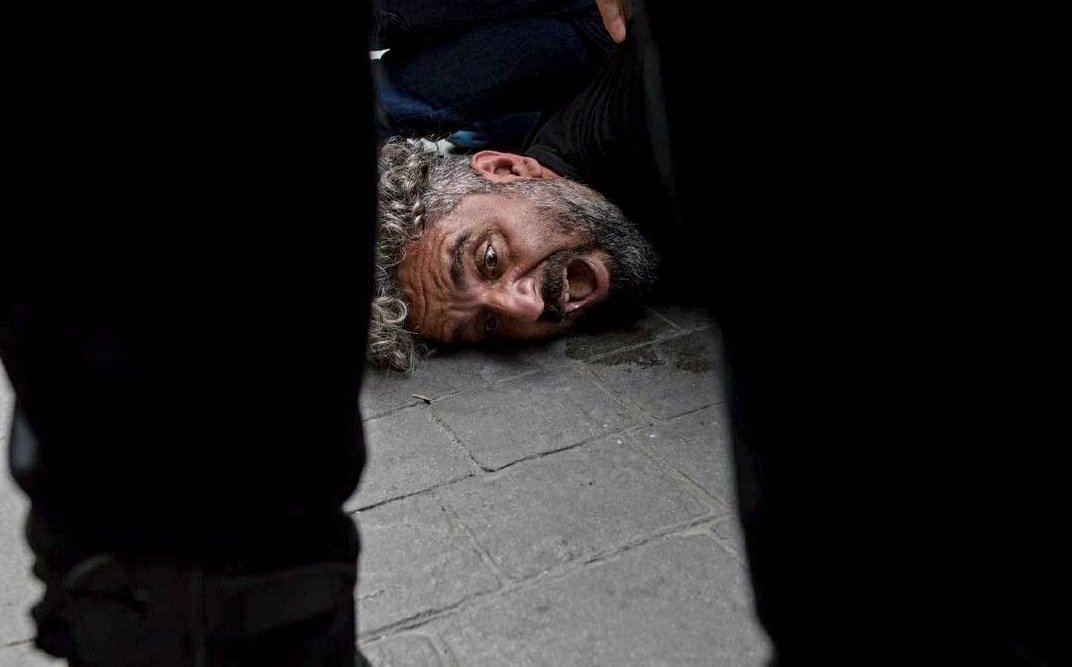Journalists are suffocated

Journalist Bulent Kilic’s hissing words “I can’t breathe” pressed on the ground, under police knees, blood-chillingly resonates with final words of slain journalist Khashoggi. Luckily award-winning journalist Kilic is very much alive but very angry.
“I can’t breathe,” were the final words uttered by Saudi journalist Jamal Khashoggi after he was set upon by a Saudi hit squad at the country’s consulate in Istanbul on October 2, 2018. During the course of the gruesome scene, described in the translated transcript of an audio recording of Khashoggi’s painful last moments, the Washington Post columnist was struggling against a group of people determined to kill him.
“I can’t breathe,” Khashoggi says.
“I can’t breathe.”
“I can’t breathe.”
The transcript noted several more voices. The voices reported to belong to Saudi officials.
And more noises depicting what happened as if subtitles of a horror scene. No dialogue but descriptions: “Scream.” “Scream.” “Gasping.” “Saw.” “Cutting.”
As such the journalist was killed.
In the videos, spread on June 26, of award-winning Turkish photojournalist Bulent Kilic, pinned on the ground, with police officers kneeled on his back and his throat, heard the same hardly discernible words hissing out of Kilic’s mouth: “I can’t breathe!”
Such reverberation is indeed blood-chilling.
On June 26, AFP photojournalist Kilic was forcefully detained after being pushed to the floor by police officers, while covering the Pride Parade in Istanbul. In videos from the incident, Kilicwas heard saying “I can’t breathe”, while the police officers kneeled on his back and neck. His camera was also broken by police officers.
What deepens the horror is resemblances of this violence to others, such as the killing of African American George Floyd by white police officers last year. Or, as Kilic himself reminded in his social media post statement after his release from custody, the killing of another Turkish journalist, Metin Goktepe, in police detention in 1996.
“The evil that killed Metin Goktepe in the Eyüp Sports Hall tried to make me breathless by pressing my neck today, but they have failed. The people thankfully claimed their journalist. All friends mobilized. It is not that easy. We have some unfinished business.
Bulent Kilic filed a “violent arrest” complaint against police officers, who pinned him to the ground.
“They tried to make an attempt on my life, they wanted to suffocate me. Whoever did this to me, I will bring them to account before the Constitutional Court, European Court of Human Rights or before whatever court of the world. As long as I live, it will be accounted for at a court,” he also posted.
Kilic was taken into custody and released three hours later after his initial statement was taken. Dozens of Pride event protesters were also briefly detained.
Many other journalists who were covering the march were reportedly targeted by the police violence on Saturday. Videos taken by journalists and citizens report several attempts by the police to prevent journalists from taking footage of LGBTI+s being violently detained during the march, while requesting to see press cards.
Kilic and Goktepe are only two of many others in Turkey to be reminded of the violence journalists face. The country has a disheartening record on the matter.
Turkey: Hero of Press Freedom in Khashoggi Murder
The mystery of Khashoggi’s murder by the order of Saudi Crown Prince Mohammed bin Salman was solved with help of Turkish intelligence and security officers, with support of the government. It is true that the international outcry to bring the perpetrators and their state accomplices to account partially been effective thanks to Turkish cooperation.
Twenty Saudi nationals have gone on trial in absentia in Turkey for the murder of the journalist. The defendants include two former aides to the prince, who denies involvement. Although probably the trial will remain a symbolic act, since Saudi Arabia rejected Turkey’s extradition request, it is regarded as a chance to get all the facts out into the open. The next hearing of the trial is scheduled for July 8.
Well, of course, another significance is that for once Turkey has the role to play the hero if press freedom. A country with notorious press freedom records itself, incidents of violence against journalists is not a coincidental aberration in Turkey. Turkish President Recep Tayyip Erdogan’s government comes under relentless criticism for stifling the media and political dissent.
Whether Turkey will see those perpetrators attacking Journalist Bulent Kilic brought before a court to account for their use of disproportionate force and violation of his human rights will determine where Turkey’s political power wants to lead the country towards. For security forced to stand trial on such deeds require a special permission by the ministry of interior affairs.
Anatomy of Journalist Prosecutions in Turkey report based on the data gathered and analysed by monitoring, documenting, and reporting on journalist prosecutions Press in Arrest Journalist Prosecutions Database proves an ongoing pattern of ‘judicial harassment’ targeting journalists.
Turkey ranked 153rd out of 180 countries in RSF’s latest World Press Freedom Index.
Not so much of a country that works diligently towards becoming a European Union (EU) member. One of the biggest factors preventing Turkey’s accession to the EU is its failure to meet the Copenhagen Criteria. Countries wishing to join the EU must guarantee democracy, the rule of law, and human rights. However, in a recent leader’s summit statement, European Council expressed concerns regarding the rule of law and fundamental rights. “The targeting of political parties, human rights defenders and media represent major setbacks for human rights and run counter to Turkey’s obligations to respect democracy, the rule of law and women’s rights.”
The statement drew negative reaction from Turkey’s rulers, who has been very eager for the chapter on customs to be reopened. Yet, the growing suppression of rights and freedoms such as the right to free assembly and freedom of thought and press among many others, renders the criteria for the country’s full accession inaccessible.
As Press in Arrest’s report exposes, the systemic use of criminal law measures against journalists targets their legitimate activities. The report also establishes that Turkey is consistently failing to meet its obligations under international law.
Reporters say their jobs became even more difficult after the Turkish police issued a circular in late April banning the dissemination of images or audio of officers without their consent.
Since April 2021, a Security General Directorate (EGM) directive instructs police officers to “take necessary action” to stop persons who are taking audio and visual recordings of public demonstrations in case the officers are being prevented from performing their duty.
Journalists Demand Accountability
Forceful detention of AFP reporter Bulent Kilic, who was following the Pride March held in Taksim on June 26, 2021, prompted press organizations’ reaction. 15 press organizations protested the rights violations against journalists in Istanbul, Ankara and Izmir with the slogan “You cannot suffocate journalism” and demanded that those responsible shall be held accountable.
Many members of the press and representatives of professional press organizations gathered in front of the Turkish Journalists’ Association, marched to the Istanbul Governor’s Office, to say “stop the police violence” in support their colleagues battered by the police during the Pride March in Taksim, Istanbul.
Dozens of journalists rallied holding photos of Award-winning photographer Bulent Kilic’s head pinned to the ground and signs read: “We can’t breathe”.
“Press freedoms cannot be suffocated,” they chanted while some hung their cameras to the fence surrounding the governor’s mansion in protest.
Similar slogans rang out during an unsanctioned event attended by dozens of reporters in a park in the Turkish capital Ankara.
“Our colleagues face violence for simply doing their job,” the Turkish Journalists’ Association’s Ankara branch head Esra Kocak Mayda said as anti-riot police observed a short distance away.
Officials defending or pretending as a response
Amidst public outrage, Deputy Interior Minister Mehmet Ersoy defended the police violence with a social media post. “Detaining the ones resisting the police during an unpermitted demonstration is not tyranny.”
The post was later retweeted by Interior Minister Süleyman Soylu.
The Provincial Security Directorate of İstanbul has released a written statement Kilic’s forceful detention. The statement reminded the ban on the march “planned to be held by groups from the LGBT …” and warnings of police officers to “the groups from the LGBT.” From the participants of the Pride March “who responded by resisting the officers despite all warnings, forty-six (46) were caught and a legal action was taken,” the statement read.
The directorate claimed that the police officers did not know that Kilic was a journalist on duty until after he was brought to the police station.
“During the proceedings at the Beyoğlu District Security Directorate, the aforementioned press member stated that he was on duty as a press member and that he pressed charges against the related personnel; his statement was taken, and he was released after this.”
The 19th İstanbul LGBTI+ Pride March to be held in İstanbul’s Taksim on Saturday, June 26 was met with heavy police violence. Only a few hours before the rally, Beyoğlu Sub-Governor’s Office announced the march was banned.
Despite all illicit, hair-raising efforts, many journalists in Turkey persistently works in line with the profession’s honour. The perseverance to keep making visible and known whatever the political power tries so hard to conceal will save both Turkey’s and its journalism’s future. As such you heard the proscribed banning of and the security forces’ brutal crackdown on the peaceful Pride March. Keep an ear and you’ll hear more. Because #JournalismIsNotACrime.

Bizi Takip Edin